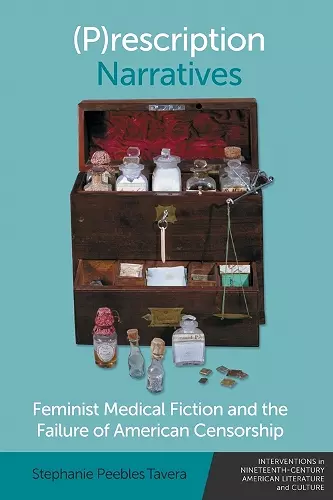(P)rescription Narratives
Feminist Medical Fiction and the Failure of American Censorship
Stephanie Peebles Tavera author
Format:Hardback
Publisher:Edinburgh University Press
Published:1st Jul '22
Currently unavailable, and unfortunately no date known when it will be back

(P)rescription Narratives reveals how the act of narrative creates the subjects of disability, race, and gender during a period of censorship in American history. In a Crip Affect reading of woman-authored medical fiction from the Comstock law era, this book astutely argues that women writers of medical fiction practice storytelling as a form of narrative medicine that prescribes various forms of healing as an antidote to the shame engineered by an American culture of censorship. Woman-authored medical fiction exposes the limitations of social construction and materiality in conversations about the female body since subject formation relies upon multiple force relations that shape and are shaped by one another in ongoing processes that do not stop despite our efforts to interpret cultural artifacts. These multiple failures – to censor, to resist, to interpret – open up a space for negotiating how we engage the world with greater empathy.
Tavera has conducted impressive, original archival and legal research in addition to delving into pertinent secondary historical sources. The author also deserves praise for her deft yet restrained use of personal and family history to bring her observations home. Equally praiseworthy is her sustained and simultaneous attention to ascriptive identities of gender, race, and disability as well as to their inextricable entanglement... Tavera deserves much credit for her deep dive into what has regrettably become the newly germane Comstock era and for making an ardent case throughout her thought-provoking book for a “new theoretical framework” mirroring the one she offers us, where concepts “like (p)resecription, animacy, sentimental biopower, and crip affect” help “(re)imagine and (re)theorize the oppositional power of nineteenth-century women writers of medical fiction”. -- Cynthia J. Davis, University of South Carolina * Tulsa Studies in Women’s Literature *
Brimming with heart and intelligence, (P)rescription Narratives turns to the fascinating topic of women’s medical fiction to stimulate vital new conversations between medical humanities, disability studies and affect theory. The result is an invigorating diagnosis of the full slipperiness of the body as it appeared in the late nineteenth century: partly plastic, the result of social life impressing upon it and partly the product of the rigid molds of race, sex and ability. Tavera brilliantly locates women writers at the frictional space where these two paradigms collide, revealing how the materiality of language and the affective dimensions of narrative become their therapeutics to expose the contradictions of their era while attempting to free themselves from them. -- Kyla Schuller, Rutgers University, New Brunswick
Stephanie Peebles Tavera’s (P)rescription Narratives makes an important contribution to the literary history of gender and medical narratives as well as intervening into critical conversations concerning literary affect and material feminisms. [...] While ambitious, Tavera’s project succeeds in covering such a large scope. Her ability to connect each woman-authored narrative to the linguistic materiality that contextualizes those narratives allows readers to see each major intervention. Whether she is arguing that Gilman and Davis craft narrative animacy working against discourses trying to de-animate disabled female bodies or that Elizabeth Stuart Phelps creates the concept of the New Man as a rescript for the New Woman, thus working to heal traumas of national gender oppression, Tavera’s study is always thoroughly developed and convincing. (P)rescription Narratives is crucial reading for anyone interested in the biosocial history of gender, race, and disability in American studies. -- Margaret Jay Jessee * Transatlantica *
[...] solidly sticks the landing as a daring, insightful, innovative, and highly relevant study. -- Sara L. Crosby, The Ohio State University at Marion * American Literary History *
Overall, the keen close analysis of the selected primary works and the book’s overarching argument merit attention. With the fall of Roe v. Wade, the “#metoo” movement, and antivaccine misinformation, Tavera’s book arrives at a time when dystopian narratives need more than a dash of utopian counternarratives. Her study of feminist medical fiction provides just that. -- Etta M. Madden, Missouri State University * Utopian Studies *
(P)rescription Narratives calls attention to the ways that Comstock-era censorship colluded with race science, medicine, and the law to limit women's sexual and reproductive autonomy. It demonstrates literature's agential capacities as the writers it addresses explicitly refute and redirect objectifying narratives... [(P)rescription Narratives is] highly relevant and important as literary and cultural scholarship, making a powerful argument for the study of the humanities. -- Nicole C. Livengood * Canadian Review of American Studies *
Throughout (P)rescription Narratives, Tavera does not shy away from the uneven complexities of feminist medical fiction. While Meyer’s play Black Souls singles out white women for sidelining Black women’s reproductive health, authors of feminist medical fiction do not quite deactivate for good the entangled discriminatory narratives surrounding impairment. Tavera reads this failure as an opportunity to recalibrate discourses of health and embodiment. (P)rescriptions are ongoing, setting into motion language and affect that challenge dominant narratives of gender, race, and disability and generate possible alternatives for Comstock-contrived shame and oppression. -- Amanda Stuckey, Central Penn College * Legacy *
ISBN: 9781474493192
Dimensions: unknown
Weight: unknown
240 pages